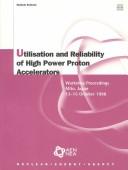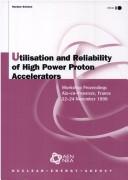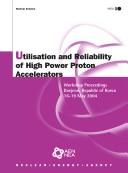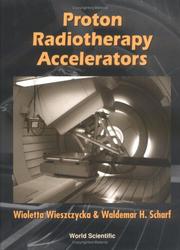| Listing 1 - 8 of 8 |
Sort by
|
Book
ISBN: 9789264102125 Year: 2003 Publisher: Paris : OECD Publishing,
Abstract | Keywords | Export | Availability | Bookmark
 Loading...
Loading...Choose an application
- Reference Manager
- EndNote
- RefWorks (Direct export to RefWorks)
R&D activities and construction plans related to high power proton accelerators are being considered in various countries to promote basic and applied sciences. Both accelerator scientists and reactor physicists gathered at an NEA workshop to discuss the reliability of the accelerator; spallation target design characteristics; safety and operational characteristics of a sub-critical system driven by a spallation source; and test facilities. These proceedings contain all the technical papers presented at the workshop, as well as summaries of the discussions held during each technical session.
Proton accelerators --- Reliability --- Accelerators, Proton --- Particle accelerators --- Mexico
Book
ISBN: 1281719927 9786611719920 9264044795 9789264044791 9264044787 Year: 2008 Publisher: Paris : Nuclear Energy Agency, Organisation for Economic Co-operation and Development,
Abstract | Keywords | Export | Availability | Bookmark
 Loading...
Loading...Choose an application
- Reference Manager
- EndNote
- RefWorks (Direct export to RefWorks)
Accelerator-driven systems (ADS) are being considered for their potential use in the transmutation of radioactive waste. The performance of such hybrid nuclear systems depends to a large extent on the specification and reliability of high power accelerators, as well as the integration of the accelerator with spallation targets and sub-critical systems. At present, much R&D work is still required in order to demonstrate the desired capability of the system as a whole. Accelerator scientists and reactor physicists from around the world gathered at an NEA workshop to discuss issues of common interest and to present the most recent achievements in their research. Discussions focused on accelerator reliability; target, window and coolant technology; sub-critical system design and ADS simulations; safety and control of ADS; and ADS experiments and test facilities. These proceedings contain the technical papers presented at the workshop as well as summaries of the working group discussions held. They will be of particular interest to scientists working on ADS development as well as on radioactive waste management issues in general.
Proton accelerators. --- Proton accelerators --- Physics --- Physical Sciences & Mathematics --- Nuclear Physics --- Reliability --- Accelerators, Proton --- Particle accelerators --- Belgium
Book
ISBN: 1614702012 9781614702016 9781608769469 1608769461 Year: 2010 Publisher: New York
Abstract | Keywords | Export | Availability | Bookmark
 Loading...
Loading...Choose an application
- Reference Manager
- EndNote
- RefWorks (Direct export to RefWorks)
Neutrons --- Spallation (Nuclear physics) --- Proton accelerators. --- Accelerators, Proton --- Particle accelerators --- Nuclear reactions --- Scattering (Physics) --- Nucleon-nucleon scattering --- Potential scattering --- Scattering.

ISBN: 9264170685 9786610034123 1280034122 9264181164 Year: 2000 Publisher: Paris : OECD Publishing,
Abstract | Keywords | Export | Availability | Bookmark
 Loading...
Loading...Choose an application
- Reference Manager
- EndNote
- RefWorks (Direct export to RefWorks)
The use of high power particle accelerators in various areas of applied nuclear science is presented with special emphasis on accelerator driven reactor systems (ADS) for transmutation of nuclear waste. National programmes for the development of spallation neutron sources are presented and the performance and reliability of existing or planned accelerators for use in ADS are discussed. Effects, such as thermal shocks and material resistance, on the reactor part of an ADS from loss of accelerator beam are discussed in greater detail.
Proton accelerators --- Accélérateurs de protons --- Congresses --- Reliability --- Congrès --- Fiabilité --- Nuclear Energy --- Nuclear Physics --- Physics --- Physical Sciences & Mathematics --- Japan --- Accelerators, Proton --- Particle accelerators

ISBN: 1280235365 9786610235360 9264194843 9789264194847 9264187499 Year: 2001 Publisher: Paris Organization for Economic Cooperation and Development. Nuclear Energy Agency
Abstract | Keywords | Export | Availability | Bookmark
 Loading...
Loading...Choose an application
- Reference Manager
- EndNote
- RefWorks (Direct export to RefWorks)
High power proton accelerators are being studied for their potential use in the transmutation of nuclear waste. The Second Workshop on Utilisation and Reliability of High Power Proton Accelerators, organised by the NEA Nuclear Science Committee, placed special emphasis on accelerator-driven system (ADS) concepts comprising a sub-critical reactor coupled with a high power accelerator. The information provided in these proceedings will primarily be of interest to scientists working on accelerator-driven systems, but also to those involved in the construction of high power accelerators.
Proton accelerators -- Congresses. --- Proton accelerators -- Reliability. --- Proton accelerators. --- Proton accelerators --- Nuclear Physics --- Physics --- Physical Sciences & Mathematics --- Reliability --- Accelerators, Proton --- Particle accelerators --- France --- Accélérateurs de protons --- Congresses --- Congrès --- Fiabilité

ISBN: 1280357436 9786610357437 9264013814 9789264013810 9264013806 Year: 2005 Publisher: Paris : Nuclear Energy Agency, Organisation for Economic Co-operation and Development,
Abstract | Keywords | Export | Availability | Bookmark
 Loading...
Loading...Choose an application
- Reference Manager
- EndNote
- RefWorks (Direct export to RefWorks)
Accelerator-driven systems (ADS) are being considered for their potential use in the transmutation of radioactive waste. The performance of such hybrid nuclear systems depends to a large extent on the specification and reliability of high power accelerators, as well as the integration of the accelerator with spallation targets and sub-critical systems. At present, much R&D work is still required in order to demonstrate the desired capability of the system as a whole. Accelerator scientists and reactor physicists from around the world gathered at an NEA workshop to discuss issues of common interest and to present the most recent achievements in their research. Discussions focused on accelerator reliability; target, window and coolant technology; sub-critical system design and ADS simulations; safety and control of ADS; and ADS experiments and test facilities. These proceedings contain the technical papers presented at the workshop as well as summaries of the working group discussions held. They will be of particular interest to scientists working on ADS development as well as on radioactive waste management issues in general.
Proton accelerators -- Congresses. --- Proton accelerators -- Reliability -- Congresses. --- Proton accelerators --- Nuclear Physics --- Physics --- Physical Sciences & Mathematics --- Reliability --- Accelerators, Proton --- Particle accelerators --- Korea, Republic of --- Accélérateurs de protons --- Congresses. --- Congrès --- Fiabilité

ISBN: 1281960667 9786611960667 9812811648 9789812811646 9781281960665 9789810245283 9810245289 661196066X Year: 2001 Publisher: [River Edge], N.J. World Scientific
Abstract | Keywords | Export | Availability | Bookmark
 Loading...
Loading...Choose an application
- Reference Manager
- EndNote
- RefWorks (Direct export to RefWorks)
Hadronic radiotherapy uses particle beams to treat tumors located near critical body structures and tumors that respond poorly to conventional photon and electron beam radiotherapy. Initial research in hadronic radiotherapy was performed using accelerators built for physics research. The good results of the proton and ion therapy programs have enhanced the tendency to use protontherapy as a routine method. There are about 20 working protontherapy facilities (first, second and third generation) and more than 30 centers are planned. This book presents the first comprehensive overview of the fi
Proton accelerators. --- Radiotherapy, High energy --- Particles (Nuclear physics) --- Elementary particles (Physics) --- High energy physics --- Nuclear particles --- Nucleons --- Nuclear physics --- High energy radiotherapy --- Megavolt radiotherapy --- Radiotherapy, Megavolt --- Radiotherapy, Supervoltage --- Supervoltage radiotherapy --- Accelerators, Proton --- Particle accelerators --- Equipment and supplies.
Book
ISBN: 3642009603 9786613562791 3642009611 1280384875 Year: 2009 Publisher: Dordrecht ; New York : Springer,
Abstract | Keywords | Export | Availability | Bookmark
 Loading...
Loading...Choose an application
- Reference Manager
- EndNote
- RefWorks (Direct export to RefWorks)
With the imminent operational start of the Japan Proton Accelerator Research Complex (J-PARC), a range of fundamental experiments in nuclear and particle physics will come within reach in the near future, while this new facility will also provide a pulsed neutron source for applications in materials and life sciences. The present volume is dedicated the detailed presentation of eight among the most promising fundamental experiments, including the study of rare kaon decays (CP and T violations), neutrino oscillations, pentaquarks, hypernuclei precision spectroscopy, muon sciences (g-2, electric dipole moment, flavour violations) and meson studies (mass modification of vector mesons in medium, bound states in nuclei). This collection of surveys by leading researchers in the field primarily addresses the many postgraduate students and nonspecialists from related areas entering this research over the next few years - they will find this volume an excellent introduction to both the physics and the particular experiments that will be conducted at J-PARC.
Proton accelerators --- Nuclear physics --- Physics --- Physical Sciences & Mathematics --- Electricity & Magnetism --- Nuclear Physics --- Research --- Nuclear physics. --- J-PARC (Project) --- Accelerators, Proton --- Atomic nuclei --- Atoms, Nuclei of --- Nucleus of the atom --- Japan Proton Accelerator Research Complex --- Nihon Genshiryoku Kenkyū Kaihatsu Kikō. --- Kō-enerugī Kasokuki Kenkyū Kikō (Japan). --- Physics. --- Quantum field theory. --- String theory. --- Heavy ions. --- Hadrons. --- Elementary particles (Physics). --- Particle acceleration. --- Physical measurements. --- Measurement. --- Particle Acceleration and Detection, Beam Physics. --- Elementary Particles, Quantum Field Theory. --- Nuclear Physics, Heavy Ions, Hadrons. --- Quantum Field Theories, String Theory. --- Measurement Science and Instrumentation. --- Particle accelerators --- Quantum theory. --- Quantum dynamics --- Quantum mechanics --- Quantum physics --- Mechanics --- Thermodynamics --- Particles (Nuclear physics) --- Acceleration (Mechanics) --- Acceleration --- Measurement . --- Measuring --- Mensuration --- Mathematics --- Technology --- Metrology --- Physical measurements --- Measurements, Physical --- Mathematical physics --- Measurement --- Models, String --- String theory --- Nuclear reactions --- Ions --- Relativistic quantum field theory --- Field theory (Physics) --- Quantum theory --- Relativity (Physics) --- Elementary particles (Physics) --- High energy physics --- Nuclear particles --- Nucleons --- Japan --- Japan. --- Proton --- Teilchenbeschleuniger --- Elementarteilchenphysik --- Kernphysik.
| Listing 1 - 8 of 8 |
Sort by
|

 Search
Search Feedback
Feedback About UniCat
About UniCat  Help
Help News
News